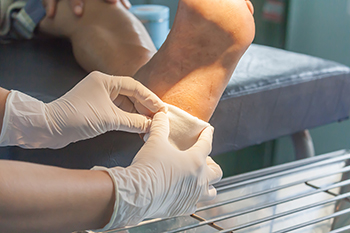
Treating wounds on the feet correctly is essential in maintaining proper foot health. Many diabetic patients with foot wounds may not be aware of them due to having neuropathy. This is defined as having damaged nerve endings from elevated blood sugar levels and it can be difficult to feel existing cuts, scrapes, or bruises on the feet. A simple wound may turn into a foot ulcer which can gradually lead to gangrene or amputation if prompt medical treatment is not received. It is suggested that diabetic patients check their feet daily for any abnormalities that may have developed, and this can be done by using a mirror or by having a family member check the soles of the feet. An existing wound is best treated by gently cleaning it with warm water, followed by covering it with a sterile bandage or dressing. If you have diabetes and develop wounds on the feet, it is strongly advised that you are under the care of a podiatrist who can help you manage this condition.
Wound care is an important part in dealing with diabetes. If you have diabetes and a foot wound or would like more information about wound care for diabetics, consult with one of our podiatrists from Riznyk Podiatry. Our doctors will assess your condition and provide you with quality foot and ankle treatment.
What Is Wound Care?
Wound care is the practice of taking proper care of a wound. This can range from the smallest to the largest of wounds. While everyone can benefit from proper wound care, it is much more important for diabetics. Diabetics often suffer from poor blood circulation which causes wounds to heal much slower than they would in a non-diabetic.
What Is the Importance of Wound Care?
While it may not seem apparent with small ulcers on the foot, for diabetics, any size ulcer can become infected. Diabetics often also suffer from neuropathy, or nerve loss. This means they might not even feel when they have an ulcer on their foot. If the wound becomes severely infected, amputation may be necessary. Therefore, it is of the upmost importance to properly care for any and all foot wounds.
How to Care for Wounds
The best way to care for foot wounds is to prevent them. For diabetics, this means daily inspections of the feet for any signs of abnormalities or ulcers. It is also recommended to see a podiatrist several times a year for a foot inspection. If you do have an ulcer, run the wound under water to clear dirt from the wound; then apply antibiotic ointment to the wound and cover with a bandage. Bandages should be changed daily and keeping pressure off the wound is smart. It is advised to see a podiatrist, who can keep an eye on it.
If you have any questions, please feel free to contact our office located in Orchard Park, NY . We offer the newest diagnostic and treatment technologies for all your foot care needs.
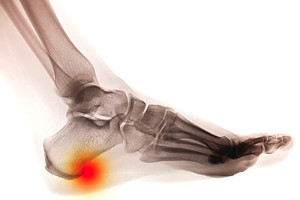
A calcium deposit that develops between the heel bone and the arch may be referred to as a heel spur. It is defined as a bony growth and it can cause little pain or the opposite, it may cause severe pain. They can gradually develop as a result of repetitive stress from walking, running, or participating in jumping activities. Additionally, wearing shoes that do not fit correctly may be a reason for a heel spur to develop as well as existing medical issues. Some people have had their heels bruised from an injury, they may have excess body weight, or they may have an abnormal gait or walking style. Heel spurs can have similar characteristics as other foot conditions, including plantar fasciitis and other forms of heel pain. Having an X-ray taken is the way to receive a proper diagnosis. Successful treatment often begins with resting the affected foot as often as possible and performing specific stretching techniques. If you have been afflicted with a heel spur, please confer with a podiatrist who can guide you toward the correct treatment which may include surgery for permanent removal.
Heel spurs can be incredibly painful and sometimes may make you unable to participate in physical activities. To get medical care for your heel spurs, contact one of our podiatrists from Riznyk Podiatry. Our doctors will do everything possible to treat your condition.
Heels Spurs
Heel spurs are formed by calcium deposits on the back of the foot where the heel is. This can also be caused by small fragments of bone breaking off one section of the foot, attaching onto the back of the foot. Heel spurs can also be bone growth on the back of the foot and may grow in the direction of the arch of the foot.
Older individuals usually suffer from heel spurs and pain sometimes intensifies with age. One of the main condition's spurs are related to is plantar fasciitis.
Pain
The pain associated with spurs is often because of weight placed on the feet. When someone is walking, their entire weight is concentrated on the feet. Bone spurs then have the tendency to affect other bones and tissues around the foot. As the pain continues, the feet will become tender and sensitive over time.
Treatments
There are many ways to treat heel spurs. If one is suffering from heel spurs in conjunction with pain, there are several methods for healing. Medication, surgery, and herbal care are some options.
If you have any questions feel free to contact our office located in Orchard Park, NY . We offer the latest in diagnostic and treatment technology to meet your needs.
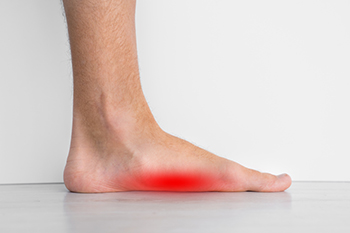
The medical name for flat feet is called pes planus. Flat feet are noticeable while standing on the floor, as the entire foot lies flat. There are some patients who have a small arch, and this is considered to be in the flat foot family. Babies are born with flat feet, and the arch generally develops between ages three and six. This happens as a result of the baby’s foot outgrowing the fat pad, and balance is often improved. If the arch fails to develop, it may be because of tight calf muscles, flexible foot and ankle ligaments, and generally poor foot stability. Many patients have little pain with flat feet, and specific stretches may help to improve flexibility. If there is pain and discomfort from this condition and completing daily activities becomes difficult to accomplish, it is suggested that you confer with a podiatrist who can prescribe custom-made orthotics, and help you with correct exercises and stretches that may provide relief.
Flatfoot is a condition many people suffer from. If you have flat feet, contact one of our podiatrists from Riznyk Podiatry. Our doctors will treat your foot and ankle needs.
What Are Flat Feet?
Flatfoot is a condition in which the arch of the foot is depressed and the sole of the foot is almost completely in contact with the ground. About 20-30% of the population generally has flat feet because their arches never formed during growth.
Conditions & Problems:
Having flat feet makes it difficult to run or walk because of the stress placed on the ankles.
Alignment – The general alignment of your legs can be disrupted, because the ankles move inward which can cause major discomfort.
Knees – If you have complications with your knees, flat feet can be a contributor to arthritis in that area.
Symptoms
Treatment
If you are experiencing pain and stress on the foot you may weaken the posterior tibial tendon, which runs around the inside of the ankle.
If you have any questions please feel free to contact our office located in Orchard Park, NY . We offer the newest diagnostic and treatment technologies for all your foot and ankle needs.
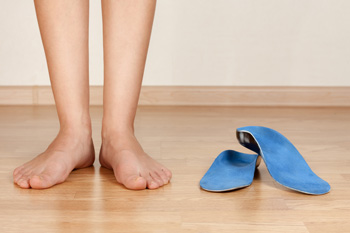
Prefabricated orthotics is another name for over-the-counter (OTC) orthotics. Custom orthotics are constructed to the precise specifications of your foot. With certain foot conditions, such as plantar fasciitis or flatfoot, there is evidence that prefabricated or custom orthotics help. They are not considered to help as much for overuse injuries like tendonitis or stress fractures. Rigid, or very stiff orthotics, can help control the foot position during walking but must exert force against the plantar part of the foot that is three to four times one’s body weight. Rigid orthotics are not particularly comfortable either, and less of this type of orthotic is used. Most often, one wears semi-rigid or accommodative orthotics, and they act almost like a bed for the foot spreading the weight more evenly across the surface of the footwear. When there is an abnormality of the foot, custom orthotics are thought to be better. Know that no orthotic—custom or OTC—will be able to treat all foot problems. Consult with a podiatrist to see which type is best for your condition.
If you are having discomfort in your feet and would like to try orthotics, contact one of our podiatrists from Riznyk Podiatry. Our doctors can provide the care you need to keep you pain-free and on your feet.
What Are Orthotics?
Orthotics are inserts you can place into your shoes to help with a variety of foot problems such as flat feet or foot pain. Orthotics provide relief and comfort for minor foot and heel pain but can’t correct serious biomechanical problems in your feet.
Over-the-Counter Inserts
Orthotics come in a wide variety of over-the-counter inserts that are used to treat foot pain, heel pain, and minor problems. For example, arch supports can be inserted into your shoes to help correct overarched or flat feet, while gel insoles are often used because they provide comfort and relief from foot and heel pain by alleviating pressure.
Prescription Orthotics
If over-the-counter inserts don’t work for you or if you have a more severe foot concern, it is possible to have your podiatrist prescribe custom orthotics. These high-quality inserts are designed to treat problems such as abnormal motion, plantar fasciitis, and severe forms of heel pain. They can even be used to help patients suffering from diabetes by treating foot ulcers and painful calluses and are usually molded to your feet individually, which allows them to provide full support and comfort.
If you are experiencing minor to severe foot or heel pain, it’s recommended to speak with your podiatrist about the possibilities of using orthotics. A podiatrist can determine which type of orthotic is right for you and allow you to take the first steps towards being pain-free.
If you have any questions please contact our office located in Orchard Park, NY . We offer the newest diagnostic and treatment technologies for all your foot and ankle needs.
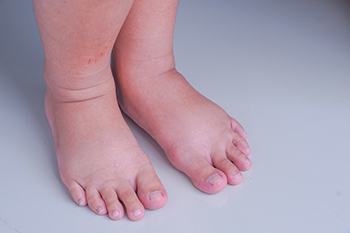
Many people have swollen feet and it is a rather common condition. It is easily noticed and can be uncomfortable. An injury is a common cause of this ailment which may disappear after the injury has healed. Additionally, there may be underlying health conditions that may cause the feet to swell and it can be a reason to seek prompt medical attention. Many pregnant women experience swollen feet, which is known as edema. Relief can come from frequently elevating the feet and from reducing salt intake. Various lifestyle factors may contribute to the development of swollen feet including sitting down for the majority of the day, wearing shoes that do not fit correctly, and being overweight. Edema may happen as a side effect of taking certain medications including antidepressants, hormones, or blood pressure medications. Many people have found effective methods that can help to control swollen feet. These can consist of drinking fresh water daily, staying active, losing an appropriate amount of weight, and consuming a healthy diet. If you suffer from swollen feet and would like to be properly diagnosed, please consult with a podiatrist who can guide you toward the correct treatment options.
Swollen feet can be a sign of an underlying condition. If you have any concerns, contact one of our podiatrists of Riznyk Podiatry. Our doctors can provide the care you need to keep you pain-free and on your feet.
Swollen feet are a common ailment among pregnant women and people who stand or sit for extended periods. Aging may increase the possibility of swollen feet and patients who are obese often notice when their feet are swelling too. There may be medical reasons why swollen feet occur:
Swollen feet can also be caused by bone and tendon conditions, including fractures, arthritis, and tendinitis. Additionally, there may be skin and toenail conditions and an infection may cause the feet to swell. Patients who take medicine to treat high blood pressure may be prone to getting swollen feet.
Many patients elevate their feet to help relieve the swelling and this is generally a temporary remedy. When a podiatrist is consulted the reason behind the swelling can be uncovered and subsequently treated.
If you have any questions please feel free to contact our office located in Orchard Park, NY . We offer the newest diagnostic tools and technology to treat your foot and ankle needs.